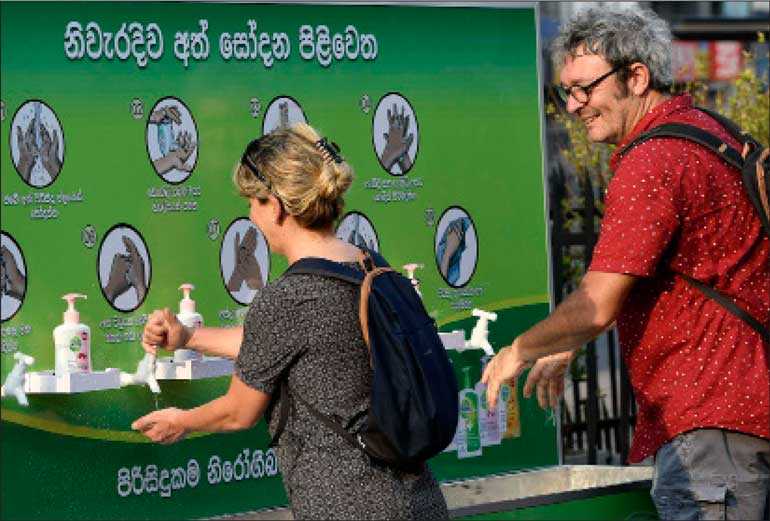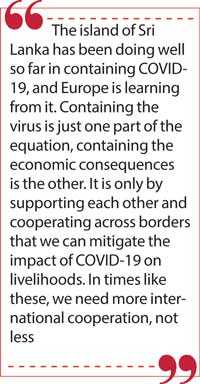Sunday Feb 22, 2026
Sunday Feb 22, 2026
Friday, 10 April 2020 00:00 - - {{hitsCtrl.values.hits}}

At this very moment, the entire world is working hard to contain COVID-19. A special tribute has to be paid to health workers, who are on the front lines of this struggle, and have the full support of all of us.
We see a low number of confirmed cases in Sri Lanka, and the determination of Governmental and  non-governmental actors to mobilise every means to implement a coordinated and effective response to the pandemic.
non-governmental actors to mobilise every means to implement a coordinated and effective response to the pandemic.
COVID-19 is a moment of truth: we have to take care of all people, despite their different vulnerabilities to the virus, and must strike the right balance in dealing with the broader economic, social, and political consequences.
For Sri Lanka and Europe, this included the safe repatriation of tourists – excellent cooperation led to good results with more than 90% of Europeans having returned home. However, we will have to be creative in ensuring that Europeans can return to Sri Lanka, that Europeans and Sri Lankans can continue to rely on good supply chains to buy each other’s products, including with the GSP+ advantage, and that remittances can go back to previous levels.
Tourism, exports, remittances are just three examples of how abrupt and impactful the economic shock is. Our work must therefore proceed on two fronts: first and foremost, we must deal with the crisis in the here and now, and reduce its spread and impact on human lives. Second, we must put all the building blocks in place to ensure that our economies recover as quickly as possible once the health crisis has passed.
Europe and Sri Lanka have been extremely clear in making life-saving their utmost priority, and have therefore taken drastic measures. If we want to limit the spread of and then eradicate the coronavirus, we have to help others to do the same or it will just come back. This is why at the beginning of the outbreak the European Commission co-financed the delivery of 56 tons of emergency medical supplies to China.
Now, the European Union (EU) is looking at the global picture, and has just announced the mobilisation of EUR 15.6 billion to help the fight against COVID-19. It is about boosting global preparedness, prevention, and containment of the virus, including with EUR 140 million to fund vaccine research. It is also to address the humanitarian, health, social and economic consequences of the crisis.
Indeed, the COVID-19 pandemic is exacerbating underlying inequalities and vulnerabilities within and across countries. This is why any support Europe can bring is for those most under pressure. This pressure is present within families (on women and children) and within communities (on farmers), and it operates at multiple levels, including on public policies and on rights and freedoms. We will also work with the UN system to help in keeping prison inmates and staff safe, but also to find ways for the criminal justice system to adapt.
This is why in Sri Lanka, we will be channelling EUR 2 million to the health sector, through the World Health Organisation, to procure test kits, ventilators, medicine and laboratory equipment, and to back current epidemiological surveillance.
Sri Lanka’s tourism sector will receive a EUR 3.5 million package so that when tourists return, small operators are also able to be part of Sri Lanka’s offer. The biggest part of the EU’s package, with EUR 16.5 million, will go to agriculture, to mobilize more private capital in rural areas, assist small businesses, workers, and families in the Uva and Central Provinces and help adapt agricultural policies to Covid-19 as well as implement them.
The island of Sri Lanka has been doing well so far in containing COVID-19, and Europe is learning from it. Containing the virus is just one part of the equation, containing the economic consequences is the other. It is only by supporting each other and cooperating across borders that we can mitigate the impact of COVID-19 on livelihoods. In times like these, we need more international cooperation, not less.
(Ambassador Denis Chaibi is the Head of the Delegation of the European Union to Sri Lanka.)